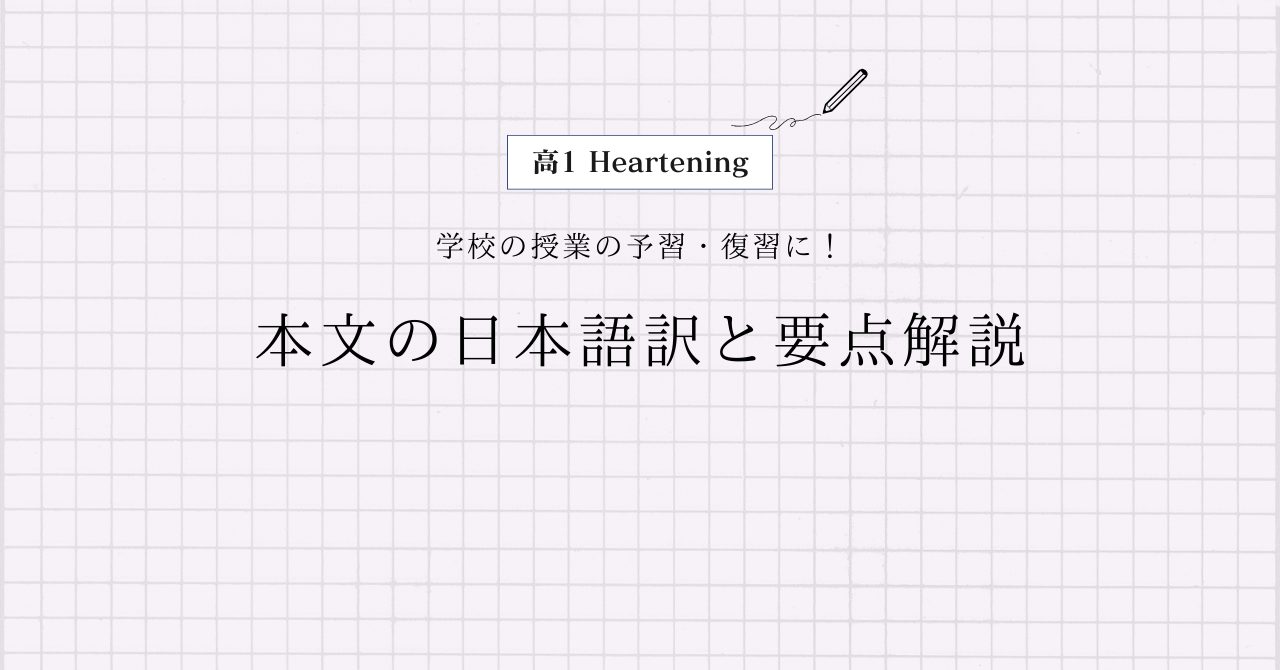桐原書店 高1Heartening Lesson3 Section4の本文の日本語訳と重要箇所の解説です。
Lesson3-1, 3-2, 3-3の解説はこちらからご覧ください。
>高1Heartening Lesson3 Section1 本文和訳
>高1Heartening Lesson3 Section2 本文和訳
>高1Heartening Lesson3 Section3 本文和訳
- Heartening Lesson3 Section4 本文と日本語訳
- Heartening Lesson3 Section4 重要事項の解説
- In California, there are more severe wildfires than before due to climate change.
- Although climate change is affecting every country in the world, the impact differs from region to region.
- For people in many developing countries, climate change is already a matter of life and death.
- These countries are most affected by climate change, even though they have contributed the least to global CO2 emissions.
- As people living in a “developed country,” we should take more responsibility to reduce CO2 emissions.
- I’m a member of our school’s environmental club.
- We talked about how to reduce CO2 emissions in our club, and we found out that air travel produces huge amounts of emissions.
- According to a report, rail travel is increasing while domestic flights are decreasing in Europe.
- We can protect the environment by using lower-emission transportation.
- Heartening Lesson3 Section4 まとめ
Heartening Lesson3 Section4 本文と日本語訳
Cindy, California 「シンディ カリフォルニア」
In California, there are more severe wildfires than before due to climate change.
「カリフォルニアでは、気候変動が原因で以前よりもたくさんの深刻な山火事が起きています。」
Although climate change is affecting every country in the world, the impact differs from region to region.
「気候変動は世界のすべての国に影響していますが、その影響は地域によって異なります。」
For people in many developing countries, climate change is already a matter of life and death.
「多くの発展途上国の人々にとって、気候変動はすでに生死にかかわる問題なのです。」
These countries are most affected by climate change, even though they have contributed the least to global CO2 emissions.
「こういった国々は世界の二酸化炭素排出量にまったく寄与していないにもかかわらず、気候変動に最も影響されています。」
As people living in a “developed country,” we should take more responsibility to reduce CO2 emissions.
「『先進国』で暮らす人々として、私たちは二酸化炭素の排出量を減らすためにもっと責任を取るべきです。」
I’m a member of our school’s environmental club.
「私は学校の環境クラブの一員です。」
We talked about how to reduce CO2 emissions in our club, and we found out that air travel produces huge amounts of emissions.
「私たちはクラブで二酸化炭素の排出量の減らし方について話し、そして飛行機での旅行が大量に排出することが分かりました。 」
According to a report, rail travel is increasing while domestic flights are decreasing in Europe.
「報告によると、ヨーロッパでは国内便が減っている一方で、鉄道旅行は増えています。」
We can protect the environment by using lower-emission transportation.
「私たちはより低排出の交通機関を使うことで環境を守ることができます。」

Heartening Lesson3 Section4 重要事項の解説
In California, there are more severe wildfires than before due to climate change.
この文は「there構文」になっていますね。今回は「~が起きている」と少し意訳しました。
“severe”は「深刻な、厳しい」といった形容詞で、“more”は“many”の「比較級」、“wildfire”は「山火事」という名詞です。
“before”は「前に、以前に」という副詞で、“due to~”は「~が理由で・原因で」といった重要表現になります。
“climate”は「気候、天候」、“change”は「変化」といった名詞ですね。
Although climate change is affecting every country in the world, the impact differs from region to region.
“although”は「~にもかかわらず」という接続詞ですね。また、この文は「現在進行形」になっています。
“affect”は「に影響する」といった動詞、“every”は「すべての」といった形容詞で、後ろには名詞の単数形を置きます。
“impact”は「影響、衝撃」という名詞で、“differ”は「異なる」という動詞になります。
“region”は「地域」という名詞で、“from region to region”は「地域によって」という表現です。
For people in many developing countries, climate change is already a matter of life and death.
“for”は「~にとって」という前置詞で、“developing country”は「発展途上国」ですね。
“already”は「もう、すでに」という副詞で、“a matter of life and death”は「死活問題、生死にかかわる問題」といった表現になります。
These countries are most affected by climate change, even though they have contributed the least to global CO2 emissions.
“these”は“this”の複数形で,「これらは(の)」といった意味になります。また「受動態」も使われていますね。
“most”は“much(とても、非常に)”という副詞の「最上級」です。
“though”は「~にもかかわらず」という接続詞で、“even”は「でさえ」といった強調を表す副詞になります。“even though”の方がより強調した表現ということですね。
“they”は“These countries”を指しています。
“contribute to~”は「~に寄与する、~の原因となる」という表現で、ここでは「現在完了形」になっていますね。
“least”は“little(少ない)”の「最上級」で、“global”は「全世界の、地球規模の」という形容詞、“emission”は「排出(量)」という名詞です。
As people living in a “developed country,” we should take more responsibility to reduce CO2 emissions.
“as”は「~として」という前置詞です。
“living”は「現在分詞」で、“living in a “developed country,” “が直前の“people”を修飾しています。
“developed country”は「先進国」のことです。
“should”は「~すべきだ、~のはずだ」という助動詞で、“take responsibility”は「責任を取る」といった表現になります。
“more”は“much(たくさんの)”の「比較級」です。
“reduce”は「を減らす」という動詞で、“to reduce”は「不定詞の副詞的用法」になっていますよ。
I’m a member of our school’s environmental club.
“a member of~”は「~の一員」という表現です。
名詞に‘sを付けると「~の」という所有を表します。
直前の名詞が複数形のときは” teachers‘ “のようにアポストロフィーだけを最後に付けます。
“environmental”は「環境の」という形容詞になります。
We talked about how to reduce CO2 emissions in our club, and we found out that air travel produces huge amounts of emissions.
“how to 動詞の原形”は「疑問詞+不定詞」の形で、「~のしかた、どう~すべきか」という意味ですね。
“found out”は“find out”の過去形で、「~だと分かる、~を発見する」という表現ですね。後ろには「接続詞that」があります。
“air travel”は「飛行機での旅行」という名詞で、“produce”は「を生み出す、生産する」という動詞になります。
“huge amounts of~”は「大量の~」という表現です。
この文の訳は少し意訳しています。
According to a report, rail travel is increasing while domestic flights are decreasing in Europe.
“according to~”は「~によると」という重要表現で、“report”は「報告、報道」といった名詞です。
“rail travel”は「鉄道旅行」という名詞、“increase”は「増える、増加する」という動詞で、ここでは「現在進行形」になっていますね。
“while”は「~の一方で、~しながら」といった接続詞で、“domestic”は「国内の、家庭の」という形容詞、“flight”は「航空便、飛行」といった名詞です。
“decrease“は「減る、減少する」という動詞になります。
We can protect the environment by using lower-emission transportation.
“protect”は「を守る」という動詞で、“environment”は「環境」という名詞になります。
“by”は「~によって」という手段を表す前置詞で、前置詞の後ろなので“using”は「動名詞」になっていますね。
“by”の意味はいろいろあるので、以下に簡単にまとめておきます。
1.受動態とセットで「~によって」
2.”by+乗り物”で「交通手段」
3.「~までに」という期限
4.「~のそばに」という場所を表す
“low-emission”は「低排出の」といった意味で、“lower”は“low(低い)”の「比較級」です。
“transportation”は「交通機関、輸送機関」という名詞になります。
Heartening Lesson3 Section4 まとめ
以上がHeartening Lesson3 Section4の日本語訳となります。
>高1Heartening Lesson3 Section1 本文和訳
>高1Heartening Lesson3 Section2 本文和訳
>高1Heartening Lesson3 Section3 本文和訳
何か分からない点や他に解説してほしい点があれば,お気軽にコメントしてください!


コメント